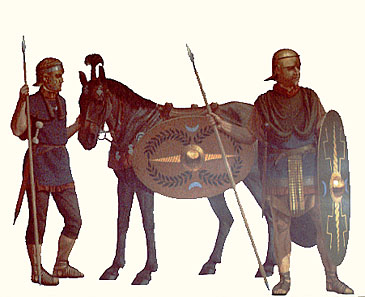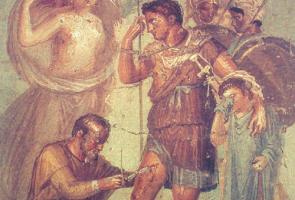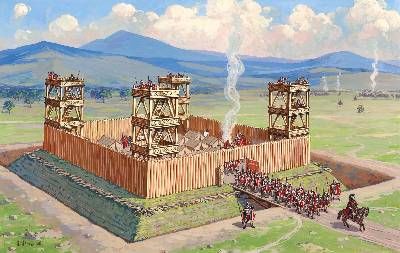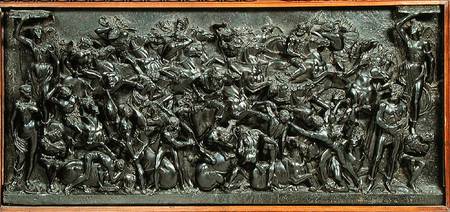I remember the day we were to leave the fort-by-the-river, the place that had been our home for nearly six years, as if it were that very day. At least in my mind I do, in my body I feel weaker and more frail with every passing day, a sign that I should to bed perhaps but what care you, my faithful reader, as long as I finish my tale, eh?
The day that our commander, Spurius Laenas, was relieved and ordered to the Hellenic theatre of conflict was a day of extreme cold, I remember. It was not cold in the sense of just an icy mountain range, it was cold as in the cold that seeps into your soul before battle or that paralyses you with fear. In my head I like to think I felt that way because we were leaving and, now that the time I had actually come to move off, I refused in my heart to leave.
“Salve, Spurius Laenas,” greeted a man on a chestnut mount, raising his hand in the formal Roman salute I would come to learn so well, he rode until he was alongside our tribunus and reigned in beside him, “I am Appius Livius Macatus and here to replace you with my own band of barbarus auxiliaries.”
Only then, within earshot of the two conversing officers, that I realised what was raising the dust cloud further down the road, not that it took very long afterwards for me to find out by myself.
Rank upon rank of clearly well-drilled but still plainly non-Roman soldiers marched past our ranks that had been assembled at the roadside to allow them passage, they were men taken from Gallia Cisalpine, from the Insubrii, cavalry from the Ligurii and Cenomanii, large infantry contingents from the Taurinii and more. Tall men, eyes staring forward as they marched in step, with beards and long hair and tattoos which marked their faces and bodies. The Ligurii, atop their more finely kept mounts, had none of these markings but certainly held better equipment than the Insubrii with their hexagonal shields, longswords and easily forged spears.
Our own ranks, in comparison, held figures of quite some splendour now that they were fully armed and armoured. One group was the large gathering of tarabostes from various Dacian tribes, all hostages I imagined, armed in fine golden scale and bearing both a sturdy shield and a falx to each man, a sign of their status and of their fighting prowess. Even the colourful Skythes, with their loose trousers, tunics and caps of oranges, golds and white outdid these drab looking Celts.
For my own part I was really not much to look at, being assigned to a group of Getic archers, men of the Getae who like myself had been trained to hunt from a very early age, each one of us given a plain looking composite bow but allowed to keep our secondary weapons beside. Dressed as we were in dark skins and brown woollens we were not much to look at, only my Gallic made cloak causing me to stand out amongst these comrades of mine who I could barely understand.
**********
As we marched towards southern Hellas, known to the Romani as Achaea, to wipe both the free-cities and the Spartans from the face of the earth, I had much more time to reflect upon events so far and greater opportunity to study things around me. After all, it was winter! Everything goes slower in winter, whether by the gods design or some unknown reason, the only reason we had been chosen to march was because Quintus Maximus considered our band made up of efferus (or savage) tribesmen from areas where we had become almost immune to the cold. It was one of those typically Roman assumptions which would mar my military career even after my discharge, but I am getting ahead of myself...
We marched once more through the alpine passes, progress slower this time, avalanches and snow-drifts taking their toll on our numbers before we even got to the stretched out plains of Gallia Cisalpine which were, unlike my previous foray this way, now covered in layer after layer of crisp white snow. If I did not know that these fields were primarily used to power the Roman juggernaut then I would have even said they were beautiful, but anything that could or would be later used to oppress my people was ugly to me and always remained so.
Weeks of marching and toil sapped us of our strength and, as we neared Illyria, so close to Pannonia and, beyond that, our homelands, there began talk of mutiny and conspiratorial whispers of desertion. I took no notice of these and refrained from informing our tribunus, the weight of the campaign already engraved heavily on his inexorable features, time taking its share of vitality from every man marching with me that winter of 564 Ab Urbe Condita.
In bits and pieces I heard that two legions, the I and II Macedonica, raised from Romanised Macedonians and Italian veterans, had been mobilised and sent marching towards the northern border of Boeotia that winter and even that Quintus Maximus, along with one of his newly appointed Praetorian Prefects Appius Artorius Trigeminus and two praetorian cohorts, had set sail from Ravenna and directed the nauarchus towards Epirus.
Anyway...we marched until our feet were bled and blistered and until the only supplies we had left were rather uneatable porridge oats. Many of our men begged the tribunus to allow us to go and hunt wild game but, as we were marching through Gallia Cisalpina and Illyria, both either a Roman province or at least a Roman client state, he ordered that what game there was should be left for the local inhabitants and not the grumbling bellies of offensive Dacian tribesmen. Someone may have even corrected him on the point that we were not all Dacii but, of course, being Roman, we all looked and acted the same to him. There were times when I hated that man and times when I loved him, at this point in time I simply resented him.
**********
Many things happened during the summer of 565 Ab Urbe Condita, I advanced a cycle in age for one thing, now nearly midway between how many cycles of life a man ought to live (that being fifty, dear reader), and we finally reached our target position in southern Epirus and on the borders of northern Boeotia.
Quintus F. Maximus, lead man of the Res Publica, had died on-board ship on his way to Epirus to join his troops and as such the nauarchus was recalled and Sextus F. Maximus, his eldest son, took the reigns of the Res Publica into his own experienced hands. Like his father before him he wanted to be seen as a conqueror, even at the age of sixty-one, and so embarked almost immediately once more as the fleet returned to Ravenna, vowing that he would see his fathers will completed and leaving Roma in the capable hands of the second Praetorian Prefect Manius Tunius Pullus, a loyal and disciplined man equally good to the task of governing cities as to leading cohorts into battle.
As time progressed we made headway into southern Illyria, near Arupium, and it was here, as we set our camp for the night, that a mixed force of over a hundred Thracian and Agrianian tribesmen decided that they had washed their hands of the Res Publica and fled without looking back. Only in the early morning light, after the buccina awoke us for inspection, did we realise the extent of the desertion but in spite of myself I could not help but smile at the gall of these men. It transpired that even two of my own barrack-mates, Dizas of the Tranipsae and Mucatus of the Derrones, had fled with the rest and, in my heart and silently on my lips, I wished them the best of fortune and luck.
Lacking over three-hundred fighting men, Spurius flogging a number of us who remained in a vain attempt at punishment, we upped camp and slogged through both Dalmatia and Epirus until we reached Calydon in Aetolia where we were allowed to rest. Some men decided to wash away the dirt and grime of the march in the Grecian river of Evinos while a few, like myself, made pilgrimage to the sanctuary of the Laphrion within the city walls.
Now, before I regale you with my experiences in the sanctuary, I think it would be prudent to tell you a few things to lay out my context of circumstance.
I was a twenty-four year old Dacian tribesman, lean, barbaric and considered beneath the social status of most 'civilised' peoples such as the Greeks and Romani. While it is true that I may have been enlisted from a backwater tribe in the middle of Dacia, our largest produce being that of honey and sometimes iron, I was far from the level of stupidity with which the soft southern people would credit me with. Already, in a manner of a few years, I had managed to pick up enough latin to make myself generally understood and certainly enough to be able to eavesdrop without those sneering, wrinkle-nosed, offspring of goat fodder knowing. No, I could not write then and, no, I did not understand the true purpose of anything the Romani did at that time, these things I would learn in later, but what I did know was that my soul craved for battle and that we were heading towards it with all haste.
Greece, Hellas, whatever you wish to call it, could not have been more different from my homeland and I marvelled at the tall buildings and life-like statues of painted marble wherever I went. I and my bull-necked companion Breucus seemed to empty streets of perfumed Greeks and toga-wearing Romani, passing here-and-there other outsiders like ourselves, my eyes and ears taking in the sights and sounds as we went.
When we got to the sanctuary of Artemis and Apollo, I remember nearly falling to my knees as I stared up at the towering representations of these two deities, their own eyes gazing down unblinkingly at the mortals who crowded like ants around their base. I also remember, with some laughter, a pair of Greek priests attempting to shoo me and my companion from the inner sanctum of their gods which, I can state now, did not work in the slightest bit. Instead we pushed through them, doing our best to look ferocious and barbarous, and knelt as others did at the feet of the two. It may interest the reader to know that even in the northern lands, where Zalmoxis and the Thracian gods reign supreme, we know of and equally worship those gods which you call 'Greek' or 'Roman' for, as my father used to tell me, “son, it doesn't matter from whence the help comes, just be glad when you're in battle and a god is kind enough to hear your prayers.”
“Apollo light-bringer and Lycoctonus, son of the she-wolf Leto, bring me glory in battle and the strength to strike down my enemies and let their blood run free along my blade,” I began, probably startling the nearby patrons with my grunting barbarian tongue, “and Artemis of the bow and hunt, let my arrows strike true and fast, let those who would harm me fall before the flight of my arrow and the release of my bow.”
By then the incense of the place, clogging and irritating to my throat and eyes, had began to get a little too much for me and I was forced to retreat with my Pannonian companion back into the reasonably fresh air of the streets without.
**********
It was bought to the attention of my commander, a few days later, that shortly after our own landing Sextus, son of Quintus, had made landfall in Aetolia and was now advancing on our own position. Not only this but an Italian legion, the I Italica, under Gaius Terentius Varro and his son Spurius T. Varro were also sailing with all haste toward the area of war. Later we would find that a separate legion, the I Rhodorum, made up of Rhodian citizens, under Titus Lucretius Triciptinus, were ordered to make their way into Attika and besiege the city of Athenae with all haste.
Though it seemed to me, in those far off days, that the entire Res Publica must me mobilising for war when in actuality it was no more than a fraction of the strength which the leading man, Sextus Maximus, could call upon if he wished to in times of need. Of course there were other leading families of the time, the Scipii, Aemilii and the Caecilii, but the Maximii controlled the both greatest estates and had the largest support in the senate, for any of these other families to have challenged them at this time would have been suicide of the highest order.
I would have war soon enough, sooner than I thought, and in the few years that followed this summer I would finally become a man, a fully fledged man, in the eyes of my people and my gods.
- M. Laenas











 Reply With Quote
Reply With Quote






















